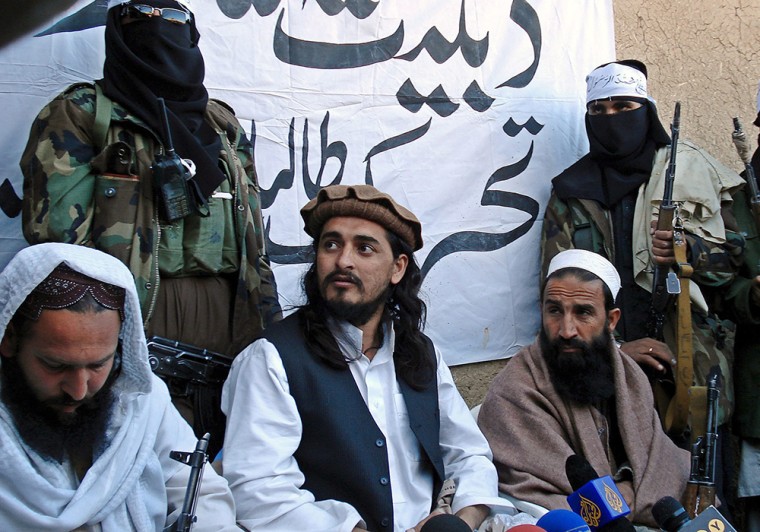The leader of the Pakistan Taliban was killed Friday in a U.S. drone strike in Northwest Pakistan, U.S. and Pakistani officials tell NBC News.
A U.S. official, speaking on condition of anonymity, confirmed the death of Hakimullah Mehsud, head of the Tehrik-i-Taliban Pakistan (TTP), in a CIA drone strike.
A Pakistani security official, also speaking on condition of anonymity, told NBC News earlier that Mehsud was killed earlier in the day in Danday Darpakhel village of North Waziristan.
A senior member of the Pakistani Taliban, who also spoke on condition of anonymity, confirmed the death.
"It is very painful to announce that our dearest, brave and sincere leader Hakimullah Mehsud died in drone attack," he said.
The U.S. official said he could not confirm other deaths in the attack, but reports in Pakistani news media said a total of four people were killed and five others injured in the strikes, which targeted a compound. The dead reportedly included two other senior TTP officials, Abdullah Bahar Mehsud, Hakimullah Mehsud's new deputy, and commander Tariq Afridi, the TTP commander in Pakistan's Dara Adamkhel region.
A senior Pakistani security official told NBC News that the country was placed on an increased state of alert to pre-empt retaliatory attacks by the Taliban.
The senior Pakistani Taliban member said the TTP held an emergency meeting in the tribal areas soon after learning of Mehsud's death and selected two commanders -- Maulvi Omar Khalid Khurasani, commander in the Mahmand tribal region, and Maulana Fazlullah, head of the Swat Taliban -- as possible replacements for Mehsud, who had a $5 million reward on his head posted by the U.S.
"Among these two men, one will replace our slain emir,” he said.
The TTP has waged a decade-long insurgency against the Pakistani government from sanctuaries along the Afghan border. It has mainly targeted the Pakistani government, in suicide bombings and other attacks, but has on occasion helped the Afghan Taliban in their war against U.S.-led NATO troops in Afghanistan.
The TTP also has claimed claims responsibility for a failed bombing plot in New York City's Times Square in 2010 as well as an attack on Camp Chapman in Afghanistan's Khost province in 2009 that killed seven CIA officials.
Pakistan's new prime minister, Nawaz Sharif, announced after his election in May that he would open unconditional talks with the Taliban and Mehsud's death came as the Pakistani government was preparing to send a peace delegation to talk with the TTP.
Hakimullah Mehsud took over the Pakistani Taliban's leadership in 2009 when his predecessor, Baitullah Mehsud, was killed in a U.S. drone strike.
He came to prominence as a young, brash field commander of the Pakistani Taliban in the mid-2000s, often appearing in propaganda videos.
U.S. officials told NBC News early last month that Mehsud’s second-in-command, Latif Mehsud, had been captured in Afghanistan by U.S. troops.
The Washington Post reported at the time that Latif Mehsud was captured as he traveled with an Afghan government convoy, and that his arrest had infuriated Afghan President Hamid Karzai.
The day after Latif Mehsud’s capture was reported on Oct. 8, Hakimullah Mehsud said in an interview with the BBC that he was open to “serious talks” with the Pakistani government aimed at reaching a peace agreement.
The drone strike was the second since Sharif visited Washington last month and pressed the Obama admistration to halt the attacks, which are seen by most Pakistanis as a violation of the country’s sovereignty.
NBC News’ Fazal Ahad, Courtney Kube, Fazul Rahim, Fakhar Remhan and Robert Windrem and the Associated Press contributed to this report.
More from NBC News Investigations:
